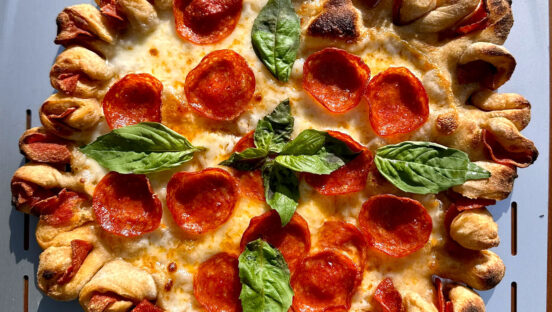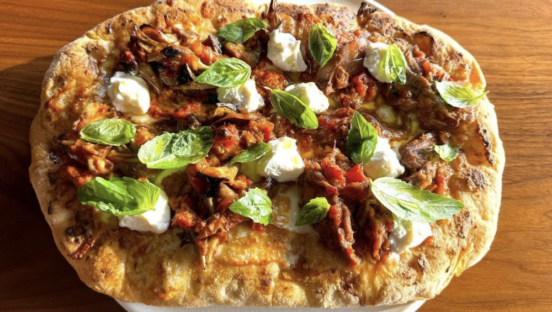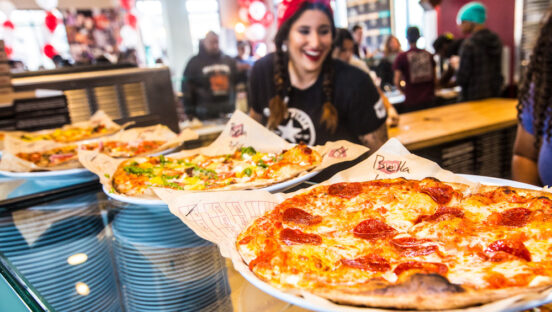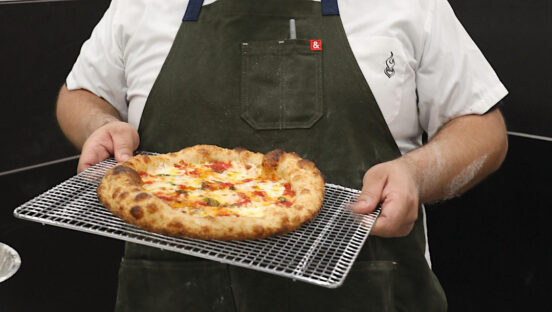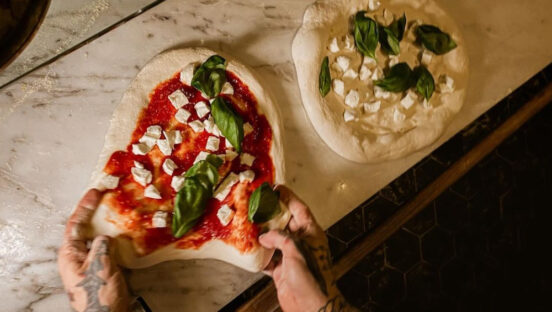By Alexandra Mortati, Women In Pizza
Growing up in Canada, Dareen Akkad, owner of What the Crust in Cairo, Egypt, was groomed to be a scientist. Pizza, let alone owning her own business, was not a thought in her mind.
“This is causing an existential crisis. People recognize me in Egypt as ‘the pizza lady’, but what’s my purpose?” Dareen says. “I never thought I’d even have my own business. My parents were academics. My dad is a physicist, and he got his PhD in France, where my parents met. I went to university to study science, and while I’ve always been a creative person and I love the arts, studying the arts was not a thing.”
She was meant to be a professional with a doctorate like her dad, she recalls. “In an Arab family, as with most immigrant families, you have to be a doctor. A medical doctor is great, but otherwise you’re expected to be a doctor of something else. I got so depressed even though I was doing well. Ultimately, I dropped out of pre-med and got a degree in the arts, but I had no support when I changed to a BA.”
Women In Pizza: Blair Pietrini is living her husband’s pizza dream and loving it
Throughout Dareen’s time in college she worked in restaurants. “I worked at Tim Horton’s and a catering company for the university. When I later moved to the UK, I worked as a waitress and bartended in a pub. Eventually I became a restaurant supervisor. I was good with people and had good sales. I just didn’t know where it was going.”
With her BA in hand, Dareen found herself working for multinational advertising agencies as an account manager and copywriter. “I met my husband when I was working in Kuwait. He was a planner and a strategist. He had helped a few start-up businesses, which planted the seed in my head. I realized you can have your own business. You can have your own thing. I was just in the rat race and hadn’t considered that I could do it too.”
Upon getting married, Dareen and her husband started to have kids. “When I became pregnant, we came back to Montreal. I have family in France and love French baked goods. I missed crackly baguettes while in Montreal, but I realized how pricey it was. I bought Ken Forkish’s book, Flour, Water, Salt, Yeast, and I started trying to do what he does religiously. I became extra obsessed and good at making good bread. I was pregnant, and I was making a loaf every day and eating it. I gained like 60 pounds. I love bread! When I had my kid, we just kept going. Then, my husband got an offer to move to Egypt, and it was too good of an offer to refuse.”
Dareen’s husband made the move without her, and they traveled back and forth to visit each other. Although she had planned to move to Egypt with the kids after her second child was born, it wasn’t until after the birth of their third child in 2019 that they were all able to join him. “My dad is Egyptian, and I had visited as a tourist,” she says. “He had tried to get us to like it. I just thought it was not my thing as kid and a young adult. Egypt has extreme poverty and wealth and everything in between. Nevertheless, we thought it would be a good adventure.”
Dareen and her husband were always thinking of what they could do next. “Egypt is full of opportunity. Whatever is up and coming comes to Egypt, like, 10 years later, like acai is now just becoming a thing. When I moved, I kept making bread and quickly realized there were no French bakeries or pizzerias. When we lived in Kuwait in 2011, there was a Neapolitan pizzeria I was obsessed with. It was on point when compared to Italy. It was owned by a Kuwaiti guy who would go to a bank job during the day and open at 6 p.m. and work until the dough was finished proofing. It was one of the most inspired things. It showed me that even if you have to do something [else] to make ends meet, you can still do what you like after. I wanted him to teach me, and he was like, ‘yeah, yeah.’ I was a nag, but he didn’t teach me, which I now understand because people ask me all the time to teach them and most of them aren’t serious.”

Courtesy of Dareen Akkad
For Dareen, the food scene in Egypt was lacking. “Bread I could make at home, but pizza was hard to find. The American-style pizza chains were crap, and the Italian-style pizzas just weren’t Italian. I started thinking about opening my own bakery or pizzeria, and a pizzeria seemed more manageable as my first experience of doing my own thing because I’d only have to worry about perfecting and managing one dough. Everyone loves pizza, but not everyone in Egypt cared for western-style bread loaves at the time.”
Her youngest child was just a few months old when Dareen started her pizza journey. “We found a nanny who saved my life. I was completely destroyed with three young kids.” Dareen was already in the midst of making plans when her nanny started. Her husband was helping with the financials, and she was busy contacting suppliers and copywriting. “It’s so hard to find suppliers here,” she says. “There are no websites, and the country tries to encourage local produce over imported, so the process took a long time and was very costly. I’d go to supermarkets, look at imported tomatoes and look for the importer on the label. Four out of five times it was a dud. Eventually I was able to find two or three importers for anything coming from abroad, but none of them took me seriously.”
With her limited resources, Dareen did all the planning she possibly could and then went to Naples to train with the AVPN. “I had ordered the oven already from Naples, so when I was in Italy, I went and visited the guys building it at Manna Forni. They made everything from scratch. At AVPN, I knew a lot about dough and had read all the books, so a lot of my training was a change of perspective. Bakery is very French-centric because they have set the rules and written the books, whereas Italians have their own method of thinking. It was a question of switching over technique and calculations on how to scale dough and learning how to do the Neapolitan slap. It’s one thing to learn, but then you have to practice these skills, like how to handle the oven and turn the pizza. I was there for about a month at the end of 2019.”
Women In Pizza: Javiera Contardo plans to keep teaching (and learning)
Back in Egypt, Dareen had found a location for her business. “It was a small hole in the wall—literally just the garage of a villa. It was a dump, but it was what we could afford. My husband and I DIY’d the refurbishments and renovations. I did all the designs and drew all of the counters and measurements. I worked with a carpenter, and my husband worked with an electrician. I had a Pinterest mood board of everything I wanted to do. It was so small. When we first started, we had 20-24 seats.”
Dareen’s oven arrived in January 2020 and, by early March, she was in testing mode. “We didn’t have a door yet. The oven was installed right at the entrance because we couldn’t bring it in any further. The floorplan was created so that the first thing that you see when you walk in is a huge oven. I was trying all the ingredients and applying what I had learned. I started from scratch because it was a completely new environment. By the end of March we realized the virus wasn’t going away and the country went into lockdown.”
“On April 1,” she continues, “my husband and I looked at each other. We had spent all of this money. My husband had a consulting contract with an airline company, and they were the first to go, so now we were in Egypt without an income and security, having spent all of our savings on this pizzeria. We weren’t 100% ready, but what else were we going to do? On April 2, 2020, we decided to just do it. Essential businesses could stay open until 7 p.m. It also coincided with our marriage anniversary, so we took it as a sign that maybe this was going to be OK.”
Throughout that first month, What the Crust grew through word of mouth. “Our neighborhood is where the embassy and UN offices are,” Dareen says. “A lot of expats live here. We had to make sure we didn’t have a line because of Covid. By July, we were able to open to 50% capacity which meant eight to 10 people at most. In September, everyone was back from the summer. I couldn’t make the dough by hand anymore, so we bought the tools we were missing. We also had our first hires. Our personal driver became a delivery driver because I didn’t want him to be out of a job, and we hired cleaning and kitchen help.”

Courtesy of Dareen Akkad
It wasn’t long before Dareen hired a friend from college who would become a partner. Opening in a pandemic led to a wild three years that brought a lot of well-deserved recognition. “We became the first AVPN affiliate in Africa, and I became the first Arabic-speaking AVPN instructor. I’m also an AVPN ambassador. We also received our first award and were named in the top 10 Neapolitan pizzas outside of Italy. Our IG was also growing and doing really well. It was insane. I was making pizzas, on the floor, training staff, and managing social media. Just three years of insanity.”
In September 2022, Dareen was invited to Naples (and again the next year) to receive 50 Top Pizza awards for one of the world’s top 100 pizzerias and for being a pizza pioneer in North Africa. “It all happened quite fast,” she remembers. “We were doing well in Cairo, which has 20 million people, so everyone asked when we were going to open more [locations]. We were just breaking even, but we thought maybe the franchise model could work, and we found the perfect guys. They wanted to open their own pizza truck. One was from a family in the hotel industry, and the other had trained at Le Cordon Bleu and in management. Through them, we opened the first pizza truck, and it became one of the first AVPN-affiliated trucks in the world. Now, with them, we have opened four more places and are working on a fifth. My first location functions as a central kitchen, and everything comes out of it. We have a truck that sends [dough] to each branch every morning. In the summer, we send some of our kitchen staff to the seasonal locations to be with them.”
In early 2023, Dareen found partners who wanted to collaborate, so she pitched a bakery concept. “Along with all of the pizza, I would wake up super early and work on perfecting a baguette. I wanted to make a baguette that French people would approve of. My kids go to a French school, so for a year, we supplied the baguettes. I had a good formula and had invested in a bread oven. Our partners saw there were few bakeries in their area, so I designed the floorplan and workflow for a nice small location they had. However, this time, I hired a team to operate the business. I handed over all of the recipes I had and trained them on how to make them.”
Managing multiple successful businesses on top of motherhood and additional projects took its toll on Dareen. “By early March I had burned out and my finger got badly injured at work. The pizzerias were running without me as I set up the bakery and I had also started taking on other projects. I was appointed to author a book on Egyptian heritage foods. There was a lot happening, and I had to disconnect. I hadn’t been to Canada in four years. I slowly started handing things over and realized we really needed a summer holiday. As soon as school ended, we came to Canada for the summer.”
Dareen took this summer as an opportunity for a much-needed reset. “I’m taking my vitamins, trying to sleep, walking in the forest and not thinking about pizza. Well, I say this but it’s not true. I handed social media over to an agency. We had 44,000 followers. We did well, so they had a good basis from which to build. I’ve been overseeing and managing as much and as little as I can from a distance.”
Her summer in Canada also allowed Dareen to reflect and start focusing on the future. “Living in Egypt is rough. We are earning in Egyptian pounds, which have been devalued three times since I’ve been there. I can’t even transfer money out of Egypt. We can’t make enough money with the income we have in Egypt, so we’re looking at locations in Montreal or Ottawa and trying to see where we can go from here.”
Though Dareen is unsure of what the future holds, she’s looking at her options. “We want to keep the brand the same in Canada, though Montreal might force us to change the name or make it French now that a new bill just passed about protecting the French language in Quebec. Ottawa felt a bit like Cairo in terms of pizza, so we’re trying to see. It’s either that or look for a job where I can earn more until I can save up and do this again. Part of the problem in Egypt is that our kids go to private school that we pay for in euros while we earn Egyptian pounds. It’s sucking us dry and completely depleting us of what we can do.”
Meanwhile, the pizza scene in Cairo is exploding. “This summer is insane. Some new pizzerias are making Neapolitan while some Italian restaurants are introducing pizza to their menu. At least a dozen new Neapolitan pizzerias in Cairo are coming up on my IG, so it’s definitely changing.”

The growing appreciation for Neapolitan pizza has also landed Dareen some great press. “We were on satellite TV twice across Middle East and were featured on popular talk shows. Everyone knows What the Crust; the brand is quite famous. People who may have seen us on TV or on social media will recognize us, and that has caused me a bit of social anxiety. We’ve been stopped on the street, in the mall, and the airport.”
Dareen isn’t threatened by the other competitors opening up and embraces it. “People are trying to do what we’re doing, and I think it’s so flattering. It gives me a chance to play my role as AVPN ambassador. I’ve been consulting with two places in Saudi Arabia. I did training for AVPN, and there’s another group of guys trying to open one of the first Italian restaurant in their city.”
What the Crust has embraced both tradition and local flair. “In the beginning I was very adamant to do it very Italian,” she recalls. “I was of the thought, ‘This is the tradition, and it’s not my job to change it.’ I was very focused on quality over quantity and wanted only a few pizzas and to make them very well. We would do a special so I could develop a recipe based on seasonality and what’s available in the market, too. While I was setting up the bakery, everyone agreed it was time to expand the menu. With Yassine, our franchise partner, we had already worked on a dozen new pizzas we could add—some classic and some creative. It became a bit of a logistical issue on training staff across all branches, so we decided to release them as seasonal specials. We released the first set at the beginning of the year, chose the winner and kept it on the menu, then chose another set, and all were popular, and we kept them all on the menu.”
Managing and growing multiple businesses is no easy feat, and Dareen has faced her share of challenges, some of which stem from being a woman. “It’s especially hard with hiring. In the beginning, some would say, ‘I’m not taking orders from a woman’ in the middle of the busiest shift, and I’d have to kick them out. It’s not my problem if he can’t handle that I’m a woman.”
While Dareen’s womanhood set her apart, it wasn’t always negative. “In Egypt, it’s a big deal that I’m the owner, that I’m a woman, and that I’m working. It’s actually one thing that helped us spread the word because it’s a combination that, culturally, many Egyptians were not used to. Somehow, it worked to our advantage. It wasn’t usual for an Arab woman to do this—although it’s starting to normalize—but I was like, ‘I’m Egyptian, I’m Arab, and I’m also an Arab-Canadian.’ I was of the mindset that ‘anything a man can do, I can do better.’ After a while, our hires saw that I worked harder than anyone. You have to lead by example. The guys that stuck around became just like me. Now, I’m able to hire more people, and they can train them. And when they see me, they don’t see that I’m a woman—in a good way.”
Dareen truly loves the work that she does and wants to encourage other women to join the industry. “I have ADHD,” she says. “I need to get energy out, so working on my feet is a good way to get out the hyperactivity. I hosted the Pizza Olympics in Egypt, and the winners were going to go on to compete in Italy. Not a single competitor was a girl. Since none of them could get a visa in time to go to Italy, AVPN sent me, and I was one of three women out of hundreds of men. In the Middle East, I think I am the first and only pizzaiola who owns her own place and is head chef.”
She continues: “I’ve been very adamant about hiring women, but I honestly had to give up because there were so many cultural hiccups, like fathers wouldn’t let them stay out late or work with men. I’ve been able to find a few, but it’s not as many as I’d hoped. I partnered with a refugee agency that trains refugees in different skills and gives us a list of candidates that would be willing and able to work. So far, two of them have been approved to move to Canada and Australia!”
Dareen’s advice for other aspiring pizzaiolas: Find a good partner who can fill the gaps that aren’t your strong suits. “I was never alone. My husband was my partner from the beginning. In any kind of new venture, there has to be someone you trust and who trusts you unconditionally. With my husband, I knew we’d support each other no matter what. He was my biggest cheerleader. He gave me all of the encouragement I needed, and when I couldn’t go on anymore, he was able to take over. He was also able to address concerns with the guys that maybe I wasn’t able to.”
She adds that there is no one-size-fits-all solution for a successful business. “If you’re a woman and trying to start your own thing, it will be hard, so you have to be realistic. It might be hard for suppliers and guests to take you seriously, so you have to take yourself seriously. Your work speaks for itself, and ours did. In Egypt, my husband is a unicorn, too. He’s looked after the kids while I’ve worked. He’s stayed behind while I went to train. He gives me the credit when he deserves it just as much. Not many men support their wives like that. Try to find your unicorn partner.”
Working with a family member or spouse can be taxing on a relationship, but Dareen and her husband were realists early on. “We knew from the beginning that conflict would come if there was not a decision maker clearly assigned. We complete each other in that he can’t make pizza and I can’t manage like he can. For a while, we couldn’t escape work, but we understood how to market ourselves and the power of social media. It definitely helped that both of us are branding professionals, but you can’t do it all alone. Both of us are honest with ourselves and each other about what we can and can’t do.”
Dareen also attributes some of her success to good fortune. “I have to admit that there has to be a little bit of luck. Covid and how it happened was lucky for us, though we may not have seen it right away. I learned so much in this experience. I am better off making the pizza because I don’t enjoy the responsibility I have grown into where I am the boss.”
As for the future, Dareen is focused on her financial plan and goals. “I need to know how much I can afford in rent, the oven costs, the renovations, the ingredients…I have the right foundation in Egypt to make sure it maintains its quality and service standards. I keep track of all the reviews. In a year, I’m hoping to finish the book and make sure everything is working and that whatever is needed from us is something we can do [from a] distance or [through] occasional trips. I’ve always had a bit of a complex being raised by an Arab dad who always said boys could do things that I couldn’t do, and it just boiled my blood.”
Dareen is fierce, honest and tenacious. She goes after what she wants and is motivated by those who doubt her. She’s filled with gratitude for the people who have helped her achieve the success she has today and looks for ways to pay it forward and encourage others.
Alexandra Mortati is the marketing director for Orlando Foods and founder of Women In Pizza, a not-for-profit organization that empowers women in the pizza industry to share their stories, display their talents, inspire innovations, and connect with one another and the world. This article originally appeared on the Instagram account for Women In Pizza. Click here to learn more about the organization.







